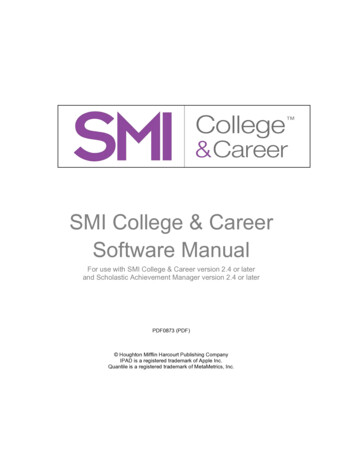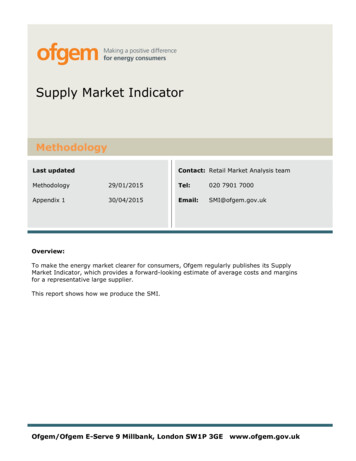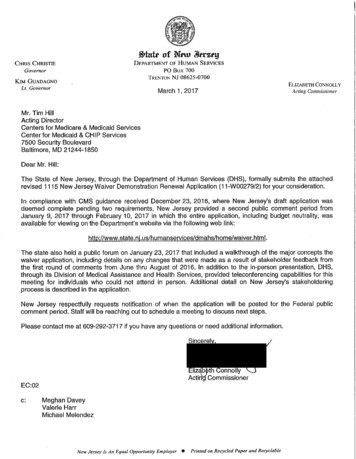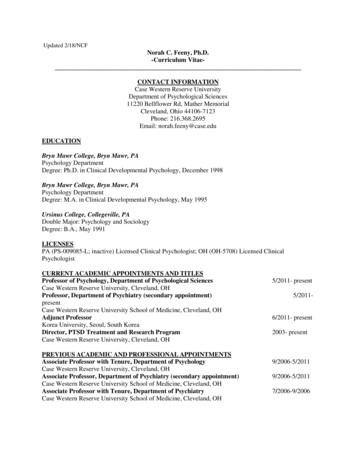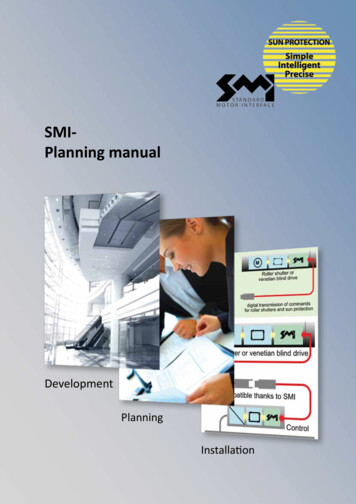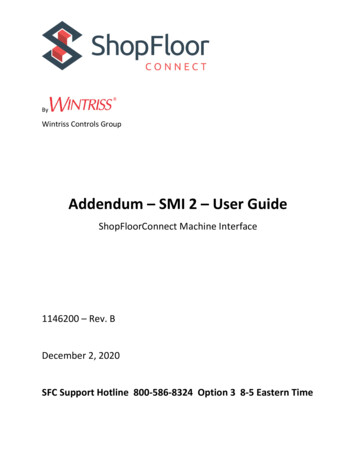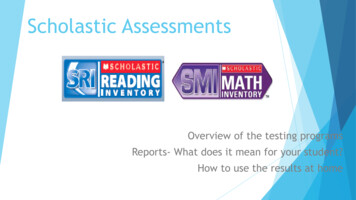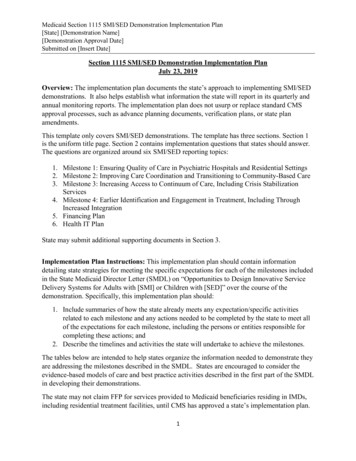
Transcription
Medicaid Section 1115 SMI/SED Demonstration Implementation Plan[State] [Demonstration Name][Demonstration Approval Date]Submitted on [Insert Date]Section 1115 SMI/SED Demonstration Implementation PlanJuly 23, 2019Overview: The implementation plan documents the state’s approach to implementing SMI/SEDdemonstrations. It also helps establish what information the state will report in its quarterly andannual monitoring reports. The implementation plan does not usurp or replace standard CMSapproval processes, such as advance planning documents, verification plans, or state planamendments.This template only covers SMI/SED demonstrations. The template has three sections. Section 1is the uniform title page. Section 2 contains implementation questions that states should answer.The questions are organized around six SMI/SED reporting topics:1. Milestone 1: Ensuring Quality of Care in Psychiatric Hospitals and Residential Settings2. Milestone 2: Improving Care Coordination and Transitioning to Community-Based Care3. Milestone 3: Increasing Access to Continuum of Care, Including Crisis StabilizationServices4. Milestone 4: Earlier Identification and Engagement in Treatment, Including ThroughIncreased Integration5. Financing Plan6. Health IT PlanState may submit additional supporting documents in Section 3.Implementation Plan Instructions: This implementation plan should contain informationdetailing state strategies for meeting the specific expectations for each of the milestones includedin the State Medicaid Director Letter (SMDL) on “Opportunities to Design Innovative ServiceDelivery Systems for Adults with [SMI] or Children with [SED]” over the course of thedemonstration. Specifically, this implementation plan should:1. Include summaries of how the state already meets any expectation/specific activitiesrelated to each milestone and any actions needed to be completed by the state to meet allof the expectations for each milestone, including the persons or entities responsible forcompleting these actions; and2. Describe the timelines and activities the state will undertake to achieve the milestones.The tables below are intended to help states organize the information needed to demonstrate theyare addressing the milestones described in the SMDL. States are encouraged to consider theevidence-based models of care and best practice activities described in the first part of the SMDLin developing their demonstrations.The state may not claim FFP for services provided to Medicaid beneficiaries residing in IMDs,including residential treatment facilities, until CMS has approved a state’s implementation plan.1
Medicaid Section 1115 SMI/SED Demonstration Implementation Plan[State] [Demonstration Name][Demonstration Approval Date]Submitted on [Insert Date]Memorandum of Understanding: The state Medicaid agency should enter into a Memorandumof Understanding (MOU) or another formal agreement with its State Mental Health Authority, ifone does not already exist, to delineate how these agencies will work with together to design,deliver, and monitor services for beneficiaries with SMI or SED. This MOU should be includedas an attachment to this Implementation Plan.State Point of Contact: Please provide the contact information for the state’s point of contactfor the implementation plan.Name and Title:Telephone Number:Email Address:2
Medicaid Section 1115 SMI/SED Demonstration Implementation Plan[State] [Demonstration Name][Demonstration Approval Date]Submitted on [Insert Date]1. Title page for the state’s SMI/SED demonstration or SMI/SED components of the broaderdemonstrationThe state should complete this transmittal title page as a cover page when submitting its implementationplan.StateEnter state name.Demonstration nameEnter full demonstration name as listed in thedemonstration approval letter.Approval dateEnter approval date of the demonstration aslisted in the demonstration approval letter.Approval periodImplementation dateEnter the entire approval period for thedemonstration, including a start date and an enddate.Enter implementation date(s) for thedemonstration.3
Medicaid Section 1115 SMI/SED Demonstration Implementation Plan[State] [Demonstration Name][Demonstration Approval Date]Submitted on [Insert Date]2. Required implementation information, by SMI/SED milestoneAnswer the following questions about implementation of the state’s SMI/SED demonstration. States should respond to each prompt listed in the tables. Note anyactions that involve coordination or input from other organizations (government or non-government entities). Place “NA” in the summary cell if a prompt doesnot pertain to the state’s demonstration. Answers are meant to provide details beyond the information provided in the state’s special terms and conditions.Answers should be concise, but provide enough information to fully answer the question.This template only includes SMI/SED policies.PromptsSummarySMI/SED. Topic 1. Milestone 1: Ensuring Quality of Care in Psychiatric Hospitals and Residential SettingsTo ensure that beneficiaries receive high quality care in hospitals and residential settings, it is important to establish and maintain appropriate standardsfor these treatment settings through licensure and accreditation, monitoring and oversight processes, and program integrity requirements and processes.Individuals with SMI often have co-morbid physical health conditions and substance use disorders (SUDs) and should be screened and receive treatmentfor commonly co-occurring conditions particularly while residing in a treatment setting. Commonly co-occurring conditions can be very serious, includinghypertension, diabetes, and substance use disorders, and can also interfere with effective treatment for their mental health condition. They should also bescreened for suicidal risk.To meet this milestone, state Medicaid programs should take the following actions to ensure good quality of care in psychiatric hospitals and residentialtreatment settings.Ensuring Quality of Care in Psychiatric Hospitals and Residential Treatment Settings1.a Assurance that participatingCurrent Status: Provide information on current state policies and requirements for ensuring quality of care inhospitals and residential settings psychiatric hospitals and residential settings.are licensed or otherwiseauthorized by the state primarilyto provide mental healthtreatment; and that residentialtreatment facilities are accreditedby a nationally recognizedaccreditation entity prior toFuture Status: Describe planned activities to address milestone not already met and any other plans for enhancedparticipating in Medicaidquality assurance policies for inpatient and residential treatment settings.Summary of Actions Needed: Specify a list of actions needed to be completed to meet milestone criteria. Includepersons or entities responsible and timeframe for completion of each action.4
Medicaid Section 1115 SMI/SED Demonstration Implementation Plan[State] [Demonstration Name][Demonstration Approval Date]Submitted on [Insert Date]Prompts1.b Oversight process (includingunannounced visits) to ensureparticipating hospital andresidential settings meet state’slicensing or certification andaccreditation requirementsSummaryCurrent Status: Provide information on current state policies and requirements for ensuring quality of care inpsychiatric hospitals and residential settings.Future Status: Describe planned activities to address milestone not already met and any other plans for enhancedquality assurance policies for inpatient and residential treatment settings.Summary of Actions Needed: Specify a list of actions needed to be completed to meet milestone criteria. Includepersons or entities responsible and timeframe for completion of each action.1.c Utilization review process toensure beneficiaries have accessto the appropriate levels andtypes of care and to provideoversight on lengths of stayCurrent Status: Provide information on current state policies and requirements for ensuring quality of care inpsychiatric hospitals and residential settings.Future Status: Describe planned activities to address milestone not already met and any other plans for enhancedquality assurance policies for inpatient and residential treatment settings.Summary of Actions Needed: Specify a list of actions needed to be completed to meet milestone criteria. Includepersons or entities responsible and timeframe for completion of each action.1.d Compliance with programintegrity requirements and statecompliance assurance processCurrent Status: Provide information on current state policies and requirements for ensuring quality of care inpsychiatric hospitals and residential settings.Future Status: Describe planned activities to address milestone not already met and any other plans for enhancedquality assurance policies for inpatient and residential treatment settings.Summary of Actions Needed: Specify a list of actions needed to be completed to meet milestone criteria. Includepersons or entities responsible and timeframe for completion of each action.1.e State requirement thatpsychiatric hospitals andresidential settings screenbeneficiaries for co-morbidphysical health conditions,SUDs, and suicidal ideation, andfacilitate access to treatment forthose conditionsCurrent Status: Provide information on current state policies and requirements for ensuring quality of care inpsychiatric hospitals and residential settings.Future Status: Describe planned activities to address milestone not already met and any other plans for enhancedquality assurance policies for inpatient and residential treatment settings.Summary of Actions Needed: Specify a list of actions needed to be completed to meet milestone criteria. Includepersons or entities responsible and timeframe for completion of each action.5
Medicaid Section 1115 SMI/SED Demonstration Implementation Plan[State] [Demonstration Name][Demonstration Approval Date]Submitted on [Insert Date]Prompts1.f Other staterequirements/policies to ensuregood quality of care in inpatientand residential treatmentsettings.SummaryCurrent Status: Provide information on current state policies and requirements for ensuring quality of care inpsychiatric hospitals and residential settings.Future Status: Describe planned activities to address milestone not already met and any other plans for enhancedquality assurance policies for inpatient and residential treatment settings.Summary of Actions Needed: Specify a list of actions needed to be completed to meet milestone criteria. Includepersons or entities responsible and timeframe for completion of each action.SMI/SED. Topic 2. Milestone 2: Improving Care Coordination and Transitioning to Community-Based CareUnderstanding the services needed to transition to and be successful in community-based mental health care requires partnerships between hospitals,residential providers, and community-based care providers. To meet this milestone, state Medicaid programs, must focus on improving carecoordination and transitions to community-based care by taking the following actions.Improving Care Coordination and Transitions to Community-based Care2.a Actions to ensure psychiatric Current Status: Provide information on the state’s current care coordination benefits/requirements including actions tohospitals and residential settings connect beneficiaries with community-based care including pre-discharge planning, post discharge follow-up, andcarry out intensive pre-discharge information-sharing among providers.planning, and includeFuture Status: Describe planned improvements to care coordination benefits/requirements and connections tocommunity-based providers incommunity-based care, including pre-discharge planning, post discharge follow-up, and information-sharing amongcare transitions.providers.Summary of Actions Needed: Specify a list of actions needed to be completed to meet milestone criteria. Includepersons or entities responsible and timeframe for completion of each action.2.b Actions to ensure psychiatrichospitals and residential settingsassess beneficiaries’ housingsituations and coordinate withhousing services providers whenneeded and available.Current Status: Provide information on the state’s current care coordination benefits/requirements including actions toconnect beneficiaries with community-based care including pre-discharge planning, post discharge follow-up, andinformation-sharing among providers.Future Status: Describe planned improvements to care coordination benefits/requirements and connections tocommunity-based care, including pre-discharge planning, post discharge follow-up, and information-sharing amongproviders.Summary of Actions Needed: Specify a list of actions needed to be completed to meet milestone criteria. Includepersons or entities responsible and timeframe for completion of each action.6
Medicaid Section 1115 SMI/SED Demonstration Implementation Plan[State] [Demonstration Name][Demonstration Approval Date]Submitted on [Insert Date]Prompts2.c State requirement to ensurepsychiatric hospitals andresidential settings contactbeneficiaries and communitybased providers through mosteffective means possible, e.g.,email, text, or phone call within72 hours post dischargeSummaryCurrent Status: Provide information on the state’s current care coordination benefits/requirements including actions toconnect beneficiaries with community-based care including pre-discharge planning, post discharge follow-up, andinformation-sharing among providers.Future Status: Describe planned improvements to care coordination benefits/requirements and connections tocommunity-based care, including pre-discharge planning, post discharge follow-up, and information-sharing amongproviders.Summary of Actions Needed: Specify a list of actions needed to be completed to meet milestone criteria. Includepersons or entities responsible and timeframe for completion of each action.2.d Strategies to prevent ordecrease lengths of stay in EDsamong beneficiaries with SMI orSED prior to admissionCurrent Status: Provide information on the state’s current care coordination benefits/requirements including actions toconnect beneficiaries with community-based care including pre-discharge planning, post discharge follow-up, andinformation-sharing among providers.Future Status: Describe planned improvements to care coordination benefits/requirements and connections tocommunity-based care, including pre-discharge planning, post discharge follow-up, and information-sharing amongproviders.Summary of Actions Needed: Specify a list of actions needed to be completed to meet milestone criteria. Includepersons or entities responsible and timeframe for completion of each action.2.e Other Staterequirements/policies to improvecare coordination andconnections to community-basedcareCurrent Status: Provide information on the state’s current care coordination benefits/requirements including actions toconnect beneficiaries with community-based care including pre-discharge planning, post discharge follow-up, andinformation-sharing among providers.Future Status: Describe planned improvements to care coordination benefits/requirements and connections tocommunity-based care, including pre-discharge planning, post discharge follow-up, and information-sharing amongproviders.Summary of Actions Needed: Specify a list of actions needed to be completed to meet milestone criteria. Includepersons or entities responsible and timeframe for completion of each action.7
Medicaid Section 1115 SMI/SED Demonstration Implementation Plan[State] [Demonstration Name][Demonstration Approval Date]Submitted on [Insert Date]PromptsSummarySMI/SED. Topic 3. Milestone 3: Increasing Access to Continuum of Care, Including Crisis Stabilization ServicesAdults with SMI and children with SED need access to a continuum of care as these conditions are often episodic and the severity of symptoms can varyover time. Increased availability of crisis stabilization programs can help to divert Medicaid beneficiaries from unnecessary visits to EDs and admissionsto inpatient facilities as well as criminal justice involvement. On-going treatment in outpatient settings can help address less acute symptoms and helpbeneficiaries with SMI or SED thrive in their communities. Strategies are also needed to help connect individuals who need inpatient or residentialtreatment with that level of care as soon as possible. To meet this milestone, state Medicaid programs should focus on improving access to a continuum ofcare by taking the following actions.Access to Continuum of Care Including Crisis Stabilization3.a The state’s strategy toCurrent Status: Provide information on the status of the state's assessment of mental health provider availability andconduct annual assessments ofan overview of the current continuum of care, including crisis stabilization, the state’s ability of the state to trackthe availability of mental healthavailability of beds, and the use of patient assessment tools.providers including psychiatrists, Future Status: Describe plans to expand community-based services, including references to the financing plan asother practitioners, outpatient,appropriate, and the state’s plans to improve annual assessments of the availability of mental health providers and thecommunity mental healthstate’s ability to track availability of beds, and plans to encourage widespread use of patient assessment tools.centers, intensiveSummary of Actions Needed: Specify a list of actions needed to be completed to meet milestone criteria. Includeoutpatient/partial hospitalization, persons or entities responsible and timeframe for completion of each action.residential, inpatient, crisisstabilization services, andFQHCs offering mental healthservices across the state,updating the initial assessment ofthe availability of mental healthservices submitted with thestate’s demonstrationapplication. The content ofannual assessments should bereported in the state’s annualdemonstration monitoringreports.8
Medicaid Section 1115 SMI/SED Demonstration Implementation Plan[State] [Demonstration Name][Demonstration Approval Date]Submitted on [Insert Date]Prompts3.b Financing planSummaryCurrent Status: Provide information on the status of the state's assessment of mental health provider availability andan overview of the current continuum of care, including crisis stabilization, the state’s ability of the state to trackavailability of beds, and the use of patient assessment tools.Future Status: Describe plans to expand community-based services, including references to the financing plan asappropriate, and the state’s plans to improve annual assessments of the availability of mental health providers and thestate’s ability to track availability of beds, and plans to encourage widespread use of patient assessment tools.Summary of Actions Needed: Specify a list of actions needed to be completed to meet milestone criteria. Includepersons or entities responsible and timeframe for completion of each action.3.c Strategies to improve statetracking of availability ofinpatient and crisis stabilizationbedsCurrent Status: Provide information on the status of the state's assessment of mental health provider availability andan overview of the current continuum of care, including crisis stabilization, the state’s ability of the state to trackavailability of beds, and the use of patient assessment tools.Future Status: Describe plans to expand community-based services, including references to the financing plan asappropriate, and the state’s plans to improve annual assessments of the availability of mental health providers and thestate’s ability to track availability of beds, and plans to encourage widespread use of patient assessment tools.Summary of Actions Needed: Specify a list of actions needed to be completed to meet milestone criteria. Includepersons or entities responsible and timeframe for completion of each action.3.d State requirement thatproviders use a widelyrecognized, publicly availablepatient assessment tool todetermine appropriate level ofcare and length of stayCurrent Status: Provide information on the status of the state's assessment of mental health provider availability andan overview of the current continuum of care, including crisis stabilization, the state’s ability of the state to trackavailability of beds, and the use of patient assessment tools.Future Status: Describe plans to expand community-based services, including references to the financing plan asappropriate, and the state’s plans to improve annual assessments of the availability of mental health providers and thestate’s ability to track availability of beds, and plans to encourage widespread use of patient assessment tools.Summary of Actions Needed: Specify a list of actions needed to be completed to meet milestone criteria. Includepersons or entities responsible and timeframe for completion of each action.9
Medicaid Section 1115 SMI/SED Demonstration Implementation Plan[State] [Demonstration Name][Demonstration Approval Date]Submitted on [Insert Date]Prompts3.e Other staterequirements/policies to improveaccess to a full continuum ofcare including crisis stabilizationSummaryCurrent Status: Provide information on the status of the state's assessment of mental health provider availability andan overview of the current continuum of care, including crisis stabilization, the state’s ability of the state to trackavailability of beds, and the use of patient assessment tools.Future Status: Describe plans to expand community-based services, including references to the financing plan asappropriate, and the state’s plans to improve annual assessments of the availability of mental health providers and thestate’s ability to track availability of beds, and plans to encourage widespread use of patient assessment tools.Summary of Actions Needed: Specify a list of actions needed to be completed to meet milestone criteria. Includepersons or entities responsible and timeframe for completion of each action.SMI/SED. Topic 4. Milestone 4: Earlier Identification and Engagement in Treatment, Including Through Increased IntegrationCritical strategies for improving care for individuals with SMI or SED include earlier identification of serious mental health conditions and focused effortsto engage individuals with these conditions in treatment sooner. To meet this milestone, state Medicaid programs must focus on improving mental healthcare by taking the following actions.Earlier Identification and Engagement in TreatmentCurrent Status: Provide information on current strategies to increase earlier identification/ engagement in treatment,4.a Strategies for identifyingintegration of behavioral care in non-specialty settings, and specialized programs for young people with SED/SMI.and engaging beneficiarieswith or at risk of SMI or SED Future Status: Describe planned strategies to increase early identification/ engagement in treatment, integration ofin treatment sooner, e.g., with behavioral health care in non-specialty settings, and availability of specialized programs for young people withSED/SMI.supported employment andsupported programsSummary of Actions Needed: Specify a list of actions needed to be completed to meet milestone criteria. Includepersons or entities responsible and timeframe for completion of each action.4.b Plan for increasingintegration of behavioral healthcare in non-specialty settings toimprove early identification ofSED/SMI and linkages totreatmentCurrent Status: Provide information on current strategies to increase earlier identification/ engagement in treatment,integration of behavioral care in non-specialty settings, and specialized programs for young people with SED/SMI.Future Status: Describe planned strategies to increase early identification/ engagement in treatment, integration ofbehavioral health care in non-specialty settings, and availability of specialized programs for young people withSED/SMI.Summary of Actions Needed: Specify a list of actions needed to be completed to meet milestone criteria. Includepersons or entities responsible and timeframe for completion of each action.10
Medicaid Section 1115 SMI/SED Demonstration Implementation Plan[State] [Demonstration Name][Demonstration Approval Date]Submitted on [Insert Date]Prompts4.c Establishment of specializedsettings and services, includingcrisis stabilization, for youngpeople experiencing SED/SMISummaryCurrent Status: Provide information on current strategies to increase earlier identification/ engagement in treatment,integration of behavioral care in non-specialty settings, and specialized programs for young people with SED/SMI.Future Status: Describe planned strategies to increase early identification/ engagement in treatment, integration ofbehavioral health care in non-specialty settings, and availability of specialized programs for young people withSED/SMI.Summary of Actions Needed: Specify a list of actions needed to be completed to meet milestone criteria. Includepersons or entities responsible and timeframe for completion of each action.4.d Other state strategies toincrease earlieridentification/engagement,integration, and specializedprograms for young peopleCurrent Status: Provide information on current strategies to increase earlier identification/ engagement in treatment,integration of behavioral care in non-specialty settings, and specialized programs for young people with SED/SMI.Future Status: Describe planned strategies to increase early identification/ engagement in treatment, integration ofbehavioral health care in non-specialty settings, and availability of specialized programs for young people withSED/SMI.Summary of Actions Needed: Specify a list of actions needed to be completed to meet milestone criteria. Includepersons or entities responsible and timeframe for completion of each action.11
Medicaid Section 1115 SMI/SED Demonstration Implementation Plan[State] [Demonstration Name][Demonstration Approval Date]Submitted on [Insert Date]PromptsSummarySMI/SED.Topic 5. Financing PlanState Medicaid programs should detail plans to support improved availability of non-hospital, non-residential mental health services including crisisstabilization and on-going community-based care. The financing plan should describe state efforts to increase access to community-based mental healthproviders for Medicaid beneficiaries throughout the state, including through changes to reimbursement and financing policies that address gaps in accessto community-based providers identified in the state’s assessment of current availability of mental health services included in the state’s application.Current StatusF.a Increase availability of nonhospital, non-residential crisisstabilization services, includingservices made available throughFuture Statuscrisis call centers, mobile crisisunits, observation/assessmentcenters, with a coordinatedcommunity crisis response thatSummary of Actions Neededinvolves collaboration withtrained law enforcement andother first responders.F.b Increase availability of onCurrent Statusgoing community-based services,e.g., outpatient, communityFuture Statusmental health centers, partialhospitalization/day treatment,assertive community treatment,and services in integrated careSummary of Actions Neededsettings such as the CertifiedCommunity Behavioral HealthClinic model.12
Medicaid Section 1115 SMI/SED Demonstration Implementation Plan[State] [Demonstration Name][Demonstration Approval Date]Submitted on [Insert Date]PromptsSummarySMI/SED. Topic 6. Health IT PlanAs outlined in State Medicaid Director Letter (SMDL) #18-011, “[s]tates seeking approval of an SMI/SED demonstration will be expected to submit aHealth IT Plan (“HIT Plan”) that describes the state’s ability to leverage health IT, advance health information exchange(s), and ensure health ITinteroperability in support of the demonstration’s goals.” 1 The HIT Plan should also describe, among other items, the: Role of providers in cultivating referral networks and engaging with patients, families and caregivers as early as possible in treatment; and Coordination of services among treatment team members, clinical supervision, medication and medication management, psychotherapy, casemanagement, coordination with primary care, family/caregiver support and education, and supported employment and supported education.Please complete all Statements of Assurance below—and the sections of the Health IT Planning Template that are relevant to your state’s demonstrationproposal.Statements of AssuranceStatement 1: Please provide anEnter text hereassurance that the state has asufficient health ITinfrastructure/ecosystem at everyappropriate level (i.e. state,delivery system, healthplan/MCO and individualprovider) to achieve the goals ofthe demonstration. If this is notyet the case, please describe howthis will be achieved and overwhat time periodSee SMDL #18-011, “Opportunities to Design Innovative Service Delivery Systems for Adults with a Serious Mental Illness or Children with a SeriousEmotional Disturbance.” Available at ownloads/smd18011.pdf.113
Medicaid Section 1115 SMI/SED Demonstration Implementation Plan[State] [Demonstration Name][Demonstration Approval Date]Submitted on [Insert Date]PromptsStatement 2: Please confirm thatyour state’s SUD Health IT Planis aligned with the state’sbroader State Medicaid HealthIT Plan and, if applicable, thestate’s Behavioral Health ITPlan. If this is not yet the case,please describe how this will beachieved and over what timeperiod.SummaryEnter text hereStatement 3: Please confirm thatthe state intends to assess theapplicability of standardsreferenced in the InteroperabilityStandards Advisory (ISA) 2 and45 CFR 170 Subpart B and,based on that assessment, intendsto include them as appropriate insubsequen
This template only covers SMI/SED demonstrations. The template has three sections. Section 1 is the uniform title page. Section 2 contains implementation questions that states should answer. The questions are organized around six SMI/SED reporting topics: 1. Milestone 1: Ensuring Quality of Care in Psychiatric Hospitals and Residential Settings 2.
